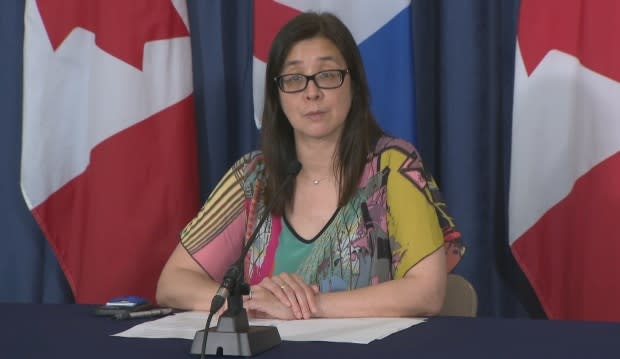Toronto reports 1,110 dead from COVID-19 but data shows progress in fight against disease
A total of 1,110 people have died of COVID-19 in Toronto, but data collected by the city shows progress in the fight against the disease, according to Toronto's medical officer of health.
Dr. Eileen de Villa said on Wednesday that two key indicators, health-care system capacity and laboratory testing, have improved on the city's COVID-19 monitoring dashboard, which tracks virus spread and containment, lab testing trends, health-care system capacity and public health system capacity.
It assigns a red, yellow, or green colour to reflect the current status of each category.
De Villa said the health care system capacity indicator, which includes data on the availability of beds, has moved to a green status because there has been a decline in the number of acute care beds occupied by patients.
And she said the lab testing trends indicator, which includes data on the average turnaround time for a test to be completed, has moved to a yellow status because the proportion of new COVID-19 tests processed by the provincial lab within 48 hours has improved to 77 per cent.
"As we conduct deeper dives into our data, we will be able to better determine what data are actionable, and how do we get ourselves ready for future COVID-19 activity, given what we have seen in other jurisdictions that are a little ahead of us in their COVID-19 outbreaks," de Villa told reporters Wednesday at a city hall news conference.
"We know that it is this kind of data analysis that will actually make a difference to us as a city and it is what best protects us and the health of the residents of this city."
Toronto reports 57 new cases in past 2 days
There have been 57 new COVID-19 cases in Toronto in the past two days. The city has a cumulative total of 14,735 cases, with a total of 12,935 people having recovered, an increase of 91 since Monday.
There are 158 people in hospital, with 35 in intensive care units and 31 on ventilators.

On Tuesday, the city's new mask bylaw took effect, which means residents are required to wear masks in all indoor public spaces. De Villa said the bylaw is an "important step" in enabling the city to continue to reopen safely.
"Wearing a mask is a simple and inexpensive action we can all take to take care of each other and do our part to keep us moving forward towards Stage 3 of reopening," De Villa said.
"Our goal throughout this pandemic has been to save lives, protect our health-care system capacity, and minimize the social, economic and broader health impact of COVID-19 on our city. Wearing a mask is an action we can all take to contribute to these goals.
"Remember, as I have shared before, I wear my mask to protect you and you wear yours to protect me."
Toronto needs federal, provincial funds now, Tory says
Mayor John Tory, who also spoke to reporters, said the city is facing roughly a $2-billion shortfall this year due to the pandemic, with 20 per cent of that coming from additional costs and 80 per cent from lost revenue — a large portion of which comes from a drop in TTC ridership.
"Those revenues are ... gone for good, and that puts a big onus on us to get the help we need in order to stabilize our own finances and to make sure we can continue to provide the services that people need," Tory said.

Earlier on Wednesday, federal Finance Minister Bill Morneau said the federal and provincial governments are continuing to discuss how to help municipalities financially, but Tory said a decision needs to be made.
"Time is up. We need help now," Tory said.
City has received 774 CafeTO registrations
Tory said the city has made "great strides" since it moved to Stage 2 of the province's reopening plan toward reviving its economy and resuming services.
He said the city has implemented CafeTO, a program to help restaurants and bars open space outdoors. The city has received 774 CafeTO registrations, installed 28 curb lane patios to support 60 businesses and authorized another 97 sidewalk patio expansions.

As well, the city has developed CampTO, a camp experience that provides outdoor and physical activities, active and quiet games, arts and crafts, and nature-based activities. The city has received 16,650 CampTO registrations.
And it launched ShopHERE in May to help independent businesses and artists open free online stores. The program, in partnership with Shopify, Google, Facebook and Mastercard, has helped more than 3,000 small businesses and artists in Toronto.
A full list of the city's "Stage 2 accomplishments" can be found here.
Businesses can apply online now for licences, permits
In addition, Tory announced that the city has launched a new online application for business licences and permits.
"The new application process allows business owners or operators requiring new licences or permits to fill out an application, submit documentation, and complete payment in one online space," the city said in a news release on Wednesday.
"It pivots what was once face-to-face to a completely online process, reducing the risk of COVID-19 transmission and creating new process efficiencies within the city."
When the pandemic hit, the city suspended the issuing of new business licences and renewal of existing licences. The city said no business licence has been cancelled and no late fees have been charged since March 17.
To apply online, business owners can select the licence or permit they are applying for on the city's Permits and Licences webpage, review the list of requirements, and an application link will be available on the specific licence or permit webpage, the city said.
The city added that licensing staff are available by phone at 416-392-6700 from 8:30 a.m. to 4:30 p.m. from Monday to Friday to answer questions.


